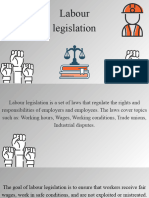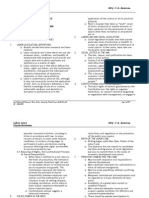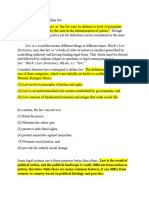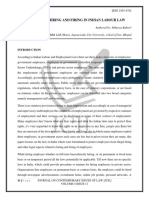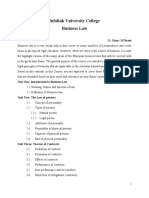Chapter 1 - Introduction: Industrial Law & Accounting (Hum-2231)
Chapter 1 - Introduction: Industrial Law & Accounting (Hum-2231)
Uploaded by
Asif HossenCopyright:
Available Formats
Chapter 1 - Introduction: Industrial Law & Accounting (Hum-2231)
Chapter 1 - Introduction: Industrial Law & Accounting (Hum-2231)
Uploaded by
Asif HossenOriginal Description:
Original Title
Copyright
Available Formats
Share this document
Did you find this document useful?
Is this content inappropriate?
Copyright:
Available Formats
Chapter 1 - Introduction: Industrial Law & Accounting (Hum-2231)
Chapter 1 - Introduction: Industrial Law & Accounting (Hum-2231)
Uploaded by
Asif HossenCopyright:
Available Formats
INDUSTRIAL LAW & ACCOUNTING (HUM-2231)
Chapter 1 - Introduction
Definition of Law: Law, as it is, is the command of the Sovereign. It means,
1. Law has its source in sovereign authority,
2. Law is accompanied by sanctions, and
3. The command to be a law should compel a course of conduct.
Being a command the law must flow from a determinate person or group of persons with the threat
of displeasure if it is not obeyed. Sovereignty is, however, only a part of the state. So, in the ultimate
sense, law emanates from the state. Thus the term Law is used to denote rules of conduct emanated
from and enforced by the state. People living in an organized society have to follow certain
common rules, otherwise' peaceful living is impossible. It is the function of the State to enforce
these rules.
Law is a system of rules that govern a society with the intention of maintaining social order,
upholding justice, and preventing harm to individuals’ property.
According to Holland, Law is, "a rule of' external human action enforced by the sovereign
political authority". From this definition, it follows that there are three essential characteristics of
law.
1. Law is a rule relating to the actions of human beings.
2. Law attempts to regulate the external actions of human beings.
3. Law is enforced by the State.
According to Salmond, "Law is the body of principles recognized and applied by the State in the
administration of justice."
According to Woodrow Wilson, "Law is that portion of the established habit and thought of
mankind which has gained distinct and formal recognition in the shape of uniform rules backed by
the authority and power of the government." This definition is practically the same as that of
Holland.
Finally, Law is the body of principles recognized and applied by the state in the administration of
justice.
Industrial Law: Industrial law is used to denote laws passed for the purpose of regulating the
conditions under which work is carried out in factories and other establishments and the
relationship between employers and employees. Industrial legislation has a two-fold objective:
1. The preservation of the health, safety, and welfare of workers, and
2. The maintenance of good relations between employers and employees. All lays dealing with these
matters come within the scope of industrial law.
SHOAIB ISLAM, LECTURER, DEPARTMENT OF HUMANITIES, RUET 1
INDUSTRIAL LAW & ACCOUNTING (HUM-2231)
Labor Law: Labor law is designed to control and govern the continuous process by which workers
and employers decide the terms and conditions of employment.
Labor Law is a set of legal forms relating to the employment relationship that defines the rights
and obligations of employees and employers.
Labor law is an area of the law that deals with the rights of employers, employees, and labor
organizations.
Labor law regulates matters such as labor employment, remunerations and conditions of work,
trade unions, and labor-management relations.
It also indicates the rules and regulations that cope with an employee’s right to join a trade union,
in particular benefits of workers, conditions of leave, especially maternity leave for women
workers, and social security workers.
Difference between Industrial Law and Labor Law:
Industrial Law Labor Law
1. Industrial law is used to denote laws passed 1. Labor law is a set of legal forms relating to
to regulate the conditions under which work is the employment relationship that defines the
carried out in factories and other rights and obligations of employees and
establishments employers
2. Industrial law is a law which is related to 2. Labor law is a law that is related to workers,
Industry employers trade unions, etc.
3. The scope of industrial Law relating to 3. The scope of labor law is the law relating to
different industries. industrial relations ordinance payment of
wages, workmen’s compensation, etc.
4. It is important for proper rules and 4. It is important for workers, and employers in
regulations of industry. industry.
5. It can include a wide range of legal topics 5. It includes the benefits of workers,
from employment law to environmental conditions of leave, and social security for
concern contracts, and industrial relations. workers.
SHOAIB ISLAM, LECTURER, DEPARTMENT OF HUMANITIES, RUET 2
INDUSTRIAL LAW & ACCOUNTING (HUM-2231)
Why students of MSE should learn Law?
Students of Material Science and Engineering can benefit from learning law for several reasons,
despite it not being a traditional part of their curriculum. Integrating legal knowledge into their
education can enhance their understanding of the legal and ethical aspects associated with their
field. Here are some compelling reasons why students in this field should consider learning law:
1. Intellectual Property (IP) Rights: Understanding intellectual property laws, such as patents,
trademarks, and copyrights, is crucial for material scientists and engineers. It helps in protecting
their research, inventions, and innovations, ensuring they reap the benefits of their hard work and
contributions to the field.
2. Compliance and Regulations: Material scientists and engineers need to comply with various
regulations and standards related to safety, environmental impact, and quality. Having knowledge
of legal frameworks and compliance requirements helps in designing and developing materials that
meet these standards.
3. Ethical Responsibilities: Knowledge of legal and ethical principles guides material scientists and
engineers in making responsible decisions. Understanding the implications of their work on
society, environment, and health is essential to uphold ethical practices in research and
development.
4. Liability and Risk Management: Learning about liability laws and risk management is essential
to mitigate potential legal risks associated with the use and application of materials. It helps
engineers design products and processes that adhere to safety standards, minimizing legal
liabilities.
5. Contract Negotiation and Dispute Resolution: Engineers often work in multidisciplinary teams
and collaborate with various stakeholders. Understanding contract law can help in negotiating
agreements and resolving disputes effectively, ensuring fair terms and conditions for all parties
involved.
6. Communication and Collaboration: Engineers often need to communicate and collaborate with
legal professionals, government agencies, and industry stakeholders. A basic understanding of
legal concepts and terminology can facilitate effective communication and collaboration.
7. Occupational Health and Safety (OHS): Knowledge of industrial law helps students understand
the legal framework for occupational health and safety regulations in industrial settings. This
understanding is crucial to ensure the safety and well-being of workers involved in the
manufacturing processes of materials.
8. Business and Entrepreneurship: Many material scientists and engineers become entrepreneurs
or work in managerial roles. Understanding business law, contracts, and intellectual property can
be invaluable in managing their ventures efficiently and legally.
Incorporating legal education into the curriculum for material science and engineering students can
be achieved through specialized courses, workshops, or interdisciplinary collaborations with law
schools. Ultimately, this knowledge equips future engineers with a broader perspective and a more
well-rounded skill set, enhancing their ability to navigate legal and ethical complexities in their
careers.
SHOAIB ISLAM, LECTURER, DEPARTMENT OF HUMANITIES, RUET 3
You might also like
- 2018 Tax Assignment MemoDocument99 pages2018 Tax Assignment MemoMethu Ncube MzilankathaNo ratings yet
- Miles R. Delos Reyes Labor Law 1 Notes 3-Juris DoctorDocument5 pagesMiles R. Delos Reyes Labor Law 1 Notes 3-Juris DoctorMilesNo ratings yet
- LABOUR LAW LecturesDocument55 pagesLABOUR LAW LecturesAtuheirwe AnnitahNo ratings yet
- 4 Labour Laws Concept Origin ObjectivesDocument6 pages4 Labour Laws Concept Origin ObjectivesVivek Kumar SinghNo ratings yet
- Lecture Notes - Topic 1Document17 pagesLecture Notes - Topic 1FiLo R BrowneNo ratings yet
- Labour Law Handout 1 (18PGS) - 1Document22 pagesLabour Law Handout 1 (18PGS) - 1Mary CharoNo ratings yet
- Week 1 Presentation BueDocument22 pagesWeek 1 Presentation Buearwa mezarNo ratings yet
- Tesfaye AdugnaDocument66 pagesTesfaye Adugnamustebedaso123lawyerNo ratings yet
- Labor Pre. 1Document35 pagesLabor Pre. 1Eduardo AnerdezNo ratings yet
- Labour LegislationDocument19 pagesLabour LegislationPalak JainNo ratings yet
- Labor Law Web 1Document34 pagesLabor Law Web 1Malek GhanmiNo ratings yet
- Labour Legislation MaterialDocument30 pagesLabour Legislation MaterialDr. MURALI KRISHNA VELAVETINo ratings yet
- ALIGARH Muslim University Aligarh: Faculty of LawDocument8 pagesALIGARH Muslim University Aligarh: Faculty of LawAnkush JadaunNo ratings yet
- SMPDocument11 pagesSMPShaine Nathalie ToledoNo ratings yet
- Labour LawDocument59 pagesLabour Lawvimal kumar TNo ratings yet
- Unit 1 IRDocument20 pagesUnit 1 IRipatel272005No ratings yet
- EEE150 CHAPTER 4 Law - Engeineering EthicsDocument31 pagesEEE150 CHAPTER 4 Law - Engeineering EthicsMUHAMMAD LUKMAN ARSHADNo ratings yet
- Knowledge Area 6Document14 pagesKnowledge Area 6HassaniNo ratings yet
- Law Prelim Midterm Exam CTRL FDocument36 pagesLaw Prelim Midterm Exam CTRL FCha PeñalozaNo ratings yet
- Ir NotesDocument46 pagesIr NotesShreya ChavanNo ratings yet
- Suntzu Labor RelDocument156 pagesSuntzu Labor RelLeo Joselito Estoque BonoNo ratings yet
- Thesis Synopsis Labour - and - Industrial - LawDocument7 pagesThesis Synopsis Labour - and - Industrial - LawSudas DuddeyNo ratings yet
- Labor Law Covers All Facets of The Legal Labor Standard Is The Amount of LaborDocument4 pagesLabor Law Covers All Facets of The Legal Labor Standard Is The Amount of LaborAnonymous 8lYw1NNo ratings yet
- Business Law LO1 Lession 1-3Document12 pagesBusiness Law LO1 Lession 1-3kadi james100% (1)
- Business Law LO1 Lession 4-6 PDFDocument12 pagesBusiness Law LO1 Lession 4-6 PDFkadi jamesNo ratings yet
- Labor Standards Final Reviewer by Atty C A AzucenaDocument103 pagesLabor Standards Final Reviewer by Atty C A AzucenaMarieNo ratings yet
- SHRM FinalDocument15 pagesSHRM FinalSalia Tobias MwinenkumaNo ratings yet
- Chap 1 & 2Document49 pagesChap 1 & 2Hazel VakhariaNo ratings yet
- Labor Standards ReviewerDocument99 pagesLabor Standards ReviewerSamantha Lei Rivera Bernal-FranciaNo ratings yet
- Labour Law in BangladeshDocument103 pagesLabour Law in BangladeshNazmul Hussain Nehal100% (1)
- Labor Law Chapter 1Document31 pagesLabor Law Chapter 1Abdullahi AbdulkadirNo ratings yet
- Introduction To Business Law: Course Instructor: Farzana TazinDocument28 pagesIntroduction To Business Law: Course Instructor: Farzana TazinHossain MahtabNo ratings yet
- Doctrine of Hiring and Firing in Indian Labour Law Abhavya Rabra 4Document18 pagesDoctrine of Hiring and Firing in Indian Labour Law Abhavya Rabra 4Rajeev shuklaNo ratings yet
- Introduction To Industrial JurisprudenceDocument25 pagesIntroduction To Industrial JurisprudenceRaju PantaNo ratings yet
- Business Law HandOut Infolink University CollegeDocument35 pagesBusiness Law HandOut Infolink University CollegeSisieNo ratings yet
- Labor RelationsDocument4 pagesLabor RelationsRicky PuquizNo ratings yet
- Act Number 2 Year 2004Document18 pagesAct Number 2 Year 2004SyafiiSatriyaNo ratings yet
- BBA V Semester (HR SPL.) : Labour Legislation Ritu BaliDocument17 pagesBBA V Semester (HR SPL.) : Labour Legislation Ritu Baliritukamalbali100% (1)
- UntitledDocument52 pagesUntitledRopafadzo MashingaidzeNo ratings yet
- Labor Standards ReviewerDocument59 pagesLabor Standards ReviewerKarl Anthony Tence DionisioNo ratings yet
- Ope 353Document3 pagesOpe 353rrajajcbNo ratings yet
- Finals Reviewer... FINALDocument27 pagesFinals Reviewer... FINAL2022-09-103No ratings yet
- Business LawDocument112 pagesBusiness Lawfeysalcabdiqaadirmohamed1234No ratings yet
- ReviewerDocument22 pagesReviewer2022-09-103No ratings yet
- Labor RelationsDocument135 pagesLabor RelationsDrew RodriguezNo ratings yet
- Employmeny LawDocument88 pagesEmploymeny LawkhadarNo ratings yet
- Democracy and LawDocument2 pagesDemocracy and Lawrecord7nepalNo ratings yet
- W2 S2 Law and GovernmentDocument30 pagesW2 S2 Law and Governmentapi-3728516No ratings yet
- Labor Laws and Labor Legislation Part 1Document2 pagesLabor Laws and Labor Legislation Part 1Pushpendra SinghNo ratings yet
- Economic IIIDocument5 pagesEconomic IIIAryan SonwaniNo ratings yet
- Business Law Study NotesDocument116 pagesBusiness Law Study NotesRUKUNDO Jean ClaudeNo ratings yet
- Labor Law 2Document80 pagesLabor Law 2dhananjayverma726No ratings yet
- Legislative Framework 1Document2 pagesLegislative Framework 1rog00745No ratings yet
- Economics Final Draft - Labour LawsDocument19 pagesEconomics Final Draft - Labour LawsSaurabh SinghNo ratings yet
- Labour Law - IDocument4 pagesLabour Law - IritikshalyaNo ratings yet
- Answers To Bar Examination Questions in Labor Law 2008.38 PagesDocument58 pagesAnswers To Bar Examination Questions in Labor Law 2008.38 PagesAlbarracin Maria Aida100% (2)
- Understanding Labour Laws in Construction Management ReportDocument17 pagesUnderstanding Labour Laws in Construction Management Reportdavidwani702No ratings yet
- Tesfaye Adugna FINALDocument67 pagesTesfaye Adugna FINALshimelisNo ratings yet
- Health LawDocument13 pagesHealth Lawsiddhumaharaj000No ratings yet
- Contract of LeaseDocument3 pagesContract of LeaseAaron NanoNo ratings yet
- 19 MC Engineering Inc. v. Court of Appeals (Digest)Document1 page19 MC Engineering Inc. v. Court of Appeals (Digest)Xylem Salvatore100% (1)
- Torralba vs. PeopleDocument20 pagesTorralba vs. PeopleD De LeonNo ratings yet
- BOC CMO 32-2017 Reactivation of The Post Clearance Audit Group of The Bureau of CustomsDocument3 pagesBOC CMO 32-2017 Reactivation of The Post Clearance Audit Group of The Bureau of CustomsPortCalls100% (2)
- Juggling More Than Three Balls at Once: Multilevel Jurisdictional Challenges in EU Data Protection RegulationDocument29 pagesJuggling More Than Three Balls at Once: Multilevel Jurisdictional Challenges in EU Data Protection RegulationMeshandren NaidooNo ratings yet
- 01 Digested Cases LTDDocument103 pages01 Digested Cases LTDMikes FloresNo ratings yet
- Land PoolingDocument25 pagesLand PoolingAmrutha Gayathri0% (1)
- Notice: Agency Information Collection Activities Proposals, Submissions, and ApprovalsDocument1 pageNotice: Agency Information Collection Activities Proposals, Submissions, and ApprovalsJustia.comNo ratings yet
- ORMOC SUGARCANE PLANTERS V CADocument2 pagesORMOC SUGARCANE PLANTERS V CAAlexir MendozaNo ratings yet
- Law of EvidenceDocument23 pagesLaw of EvidenceRahul AkellaNo ratings yet
- Boadu Corporate IdentityDocument13 pagesBoadu Corporate Identityatmoggy2003No ratings yet
- Cantu Clemency SignedDocument23 pagesCantu Clemency SignedScott Nunn100% (1)
- Defeating Corruption by LawDocument10 pagesDefeating Corruption by Lawjoe88% (8)
- Makalah Kelompok 3 TranslateDocument25 pagesMakalah Kelompok 3 Translate202110115253 DIAN AMANDA PUTRINo ratings yet
- Cecille Realty and Service Corp V CADocument3 pagesCecille Realty and Service Corp V CAZeline MarieNo ratings yet
- SAN LORENZO DEVELOPMENT CORPORATION vs. COURT OF APPEALS, PABLO S. BABASANTA, SPS. MIGUEL LU and PACITA ZAVALLA LUDocument1 pageSAN LORENZO DEVELOPMENT CORPORATION vs. COURT OF APPEALS, PABLO S. BABASANTA, SPS. MIGUEL LU and PACITA ZAVALLA LUJoannaNo ratings yet
- Second Division: People of The Philippines, G.R. No. 175319Document19 pagesSecond Division: People of The Philippines, G.R. No. 175319Panday L. MasonNo ratings yet
- Vicky Cornell V SoundgardenDocument46 pagesVicky Cornell V SoundgardenPitchfork News100% (2)
- Gonzales vs. CFIDocument4 pagesGonzales vs. CFIBestie BushNo ratings yet
- AVX LawsuitDocument15 pagesAVX LawsuitGabe CavallaroNo ratings yet
- Criminal Procedure S5 Preliminary Investigation DOJDocument19 pagesCriminal Procedure S5 Preliminary Investigation DOJPark Min RaNo ratings yet
- Implementing Rules and Regulations of The Tribal Peoples' Rights Act (Muslim Mindanao Autonomy Act 241 of 2008) Full Text With SignaturesDocument17 pagesImplementing Rules and Regulations of The Tribal Peoples' Rights Act (Muslim Mindanao Autonomy Act 241 of 2008) Full Text With SignaturesIP Dev100% (2)
- Birth Corrections new-CDMA PDFDocument2 pagesBirth Corrections new-CDMA PDFramkrishnapasalaNo ratings yet
- In The Supreme Court of India Civil Appellate Jurisdiction: ReportableDocument35 pagesIn The Supreme Court of India Civil Appellate Jurisdiction: ReportableNavod PrasannanNo ratings yet
- RH Answering Brief in Opposition To Motion To DisqualifyDocument32 pagesRH Answering Brief in Opposition To Motion To DisqualifyDealBook100% (7)
- Bac Executive Order 2022Document2 pagesBac Executive Order 2022Joselito M. BaborNo ratings yet
- Running Head: INTERNATIONAL LAW 1Document8 pagesRunning Head: INTERNATIONAL LAW 1Anonymous eGU01arDvNo ratings yet
- Oneysubc19958700 447Document2 pagesOneysubc19958700 447Hanif Abdillah RahmanNo ratings yet
- United States v. King, 1st Cir. (2014)Document11 pagesUnited States v. King, 1st Cir. (2014)Scribd Government DocsNo ratings yet









